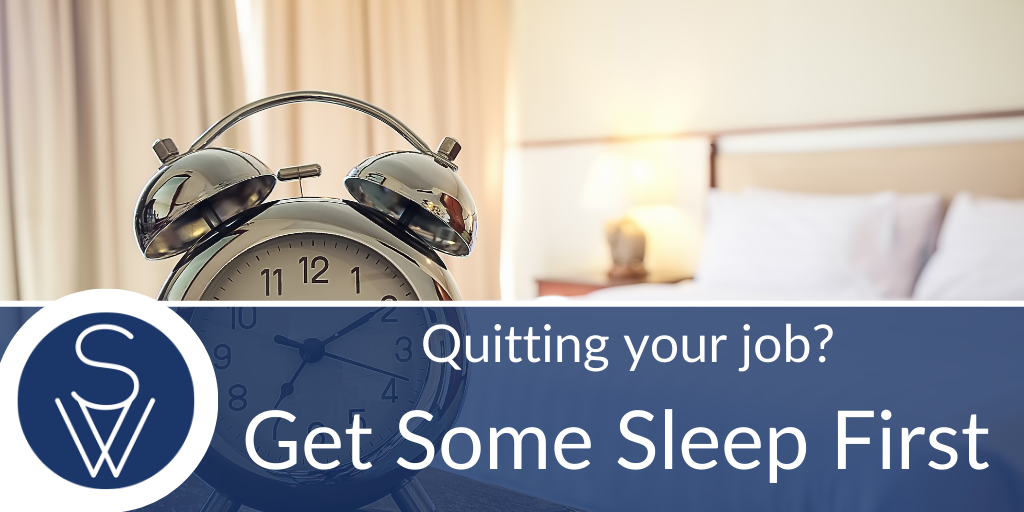An under-explored lesson from the Great Resignation.
Two years into the pandemic, a Jobsage mental health poll found that most (55%) of American workers had experienced “significant stress” within the past year, with 38% reporting symptoms of depression. In addition, a staggering number reported that it had become difficult for them to even work at their jobs, citing very specific reasons: 37% reported a “lack of motivation,” 36% named anxiety, and 31% pointed to “feelings of anger.” When asked why they had resigned, more than a quarter of respondents (28%) said it was because of the job’s “impact on their mental health.”
Now, that’s a profoundly good reason to quit your job. The question today, though, in light of new data, is this: was a poor job fit really the reason that 47 million Americans resigned in 2021? Was the job really the reason for the sudden struggles with depression, anxiety, lack of motivation, and anger among the vast majority? Or was it something else?
Today, more than 80% of those who participated in the Great Resignation report regret for their decision, according to a recent Paychex survey. Turns out, the grass wasn’t greener. They actually miss their old jobs, employers, and coworkers. Indeed, 68% of them have attempted (often successfully) to return to their former employers.
So, what does this suggest? To be clear, here’s what it doesn’t suggest: that job shopping is unwise. In fact, staying informed about the job market and staying up to date on emerging opportunities is critical to building a healthy, happy career. That said, a growing body of evidence suggests that it was something else.
According to the American Academy of Sleep Medicine, sleep issues among American adults skyrocketed so severely during the pandemic that doctors gave the phenomenon its own name: covid-somnia.
There is a powerful lesson that we should all apply, both as employers and as employees: if you’re feeling chronically miserable at a job that once made you happy, the first question to ask yourself isn’t “how quickly can I get a different job?”
It’s probably something almost embarrassingly basic: “How am I sleeping?”
Think about it. Every job will have its bumpy days or new developments that require us to adapt. That is how we grow. But a sleep-deprived brain is simply not equipped to rationally evaluate, prioritize, or resolve new challenges. That is because a sleep-deprived brain is not in growth mode; it’s in survival mode. A sleep-deprived mind goes quickly into Fight or Flight.
Sleep Loss, Cortisol, and the Dangers of “Fight or Flight Syndrome”
Studies reveal that, if you’re regularly missing critical sleep, you’re launching a steady increase in stress – and stress hormones, including cortisol - that undermine your ability to navigate your daily life. Over time, depression and anxiety set in, skewing your judgment. Exhaustion takes its quiet toll, chipping away at the very enthusiasm you once brought to your job – and the satisfaction you once derived from it. As we yearn to make life feel better again, there is a natural tendency to suspect that the job – that thing that occupies most of the daytime hours of our lives – is the problem. The more you dread your work, the easier it is to believe that the job is the problem.
Before Quitting Your Job, Get Help with Your Sleep Habits
Getting enough sleep sounds like it should just be a matter of choice. Yet, for many Americans, the harder we try to will ourselves to nod off, the more wide awake we are. With help, however, chronic sleep loss is an entirely fixable problem. Start by taking advice from the Mayo Clinic and tell your doctor about your sleep issues. They can help you get to the root of the issue and in touch with the right help to fix it. On a very bright note, Cognitive Behavioral Therapy (CBT, known for its effectiveness in treating many challenges), now has a specialty: CBT-I (yes, the I is for Insomnia) that Mayo recommends as “the first line of treatment for people with insomnia” because it is “equally or more effective than sleep medications.”
The mass soul-searching catalyzed by the pandemic was a silver lining during a bleak and difficult time. Hopefully, it taught us all to reflect more often and more intentionally on our values, our lives, and how we spend our time, energy, and talents. It’s good practice to re-examine how well your job “fits” with your personal goals, your values, and career needs. But if covid, covidsomnia, the Great Resignation, and the Great Regret that followed it, can teach us anything, it’s this: a tired mind is at risk of drawing inaccurate – even backward – assessments of “cause-and-effect.” It seems that, for many “Great Regretters,” it wasn’t the job that was making the job seem so miserable during covid.
It was simply, regrettably, a lack of sleep.
At Skybridge Americas, we specialize in matching great career opportunities with highly talented candidates. If you would like to know more about how we can help you find the right match, please reach out. We would love to talk!
---
Related Reading:








